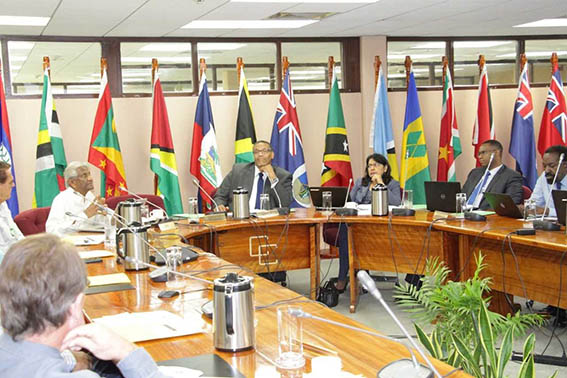Regional poultry producers have expressed concern at the non-adoption of specifications for their meat and feeds which had been developed by the standards body, CROSQ and approved.
At a meeting on Monday, CARICOM officials heard members of the CARICOM Poultry Association (CPA) say that they had been in dialogue with the United States Department of Agriculture for these standards devised by the CARICOM Regional Organisation for Standards and Quality (CROSQ) to be met on products exported to the region. To ensure that goods of the highest quality are circulating in CARICOM, the CPA is emphasising labelling of poultry and poultry products with the date of slaughter so that sub-standard products do not enter the Region.
A release from the CARICOM Secretariat yesterday said that the CPA representatives told the Secretariat team that poultry producers were making inroads in the fast-growing area of value-added offerings such as pre-seasoned, ready-to-cook, and fully-cooked products. In this regard, the Association identified jerk, curried and other regional indigenous seasoned meat as its greatest potential for export.
The meeting at the CARICOM Secretariat also discussed the developments in liquid eggs, breeder eggs, feed production, cogeneration and meeting the demands of a very differentiated poultry market through more than sixty fresh product types.
Assistant Secretary-General, Trade and Economic Development, Joseph Cox said that the meeting was elucidatory and that the exchanges provided the CARICOM Secretariat with a much better understanding of the developmental plans of the industry. The release said that the CPA members voiced their appreciation for the support and guidance provided by the Secretariat and agreed that interventions at the national level were also needed to make better use of the opportunities under the CARICOM Single Market and Economy (CSME).
The release said that poultry meat accounts for more than 80 per cent of meat consumed in the region. Most of the poultry meat and eggs consumed within CARICOM comes from CPA members with self-sufficiency hovering at about 67 per cent for meats and close to 100 per cent for eggs. The industry produces about 243,000 metric tonnes of poultry, 122 million dozen eggs per year, accounts for the employment of more than 100,000 persons and annual sales of US$660M.
The release said that around the table on Monday were high level officials including Assistant Secretary-General, Trade and Economic Development, Cox; Director, CARICOM Single Market and Sectoral Programmes, Dr. Richard Brown; CARICOM Programme Manager, Agriculture and Industry, Nisa Surujbally and Deputy Programme Manager, Agricultural Development, Dr. Ronnie Brathwaite.
The representatives of the CPA were President, David Reimer, of Belize; Dr. Desmond A. Ali, Executive Director; Christopher Levy, Executive Chairman Jamaica Broilers Limited; Conley Salmon, President Jamaica Operation of Jamaica Broilers Limited; Peter de Freitas, CPA President-elect and Chief Executive Officer of Barbados’ Chickmont Foods Limited; Dr. Keith Amiel, Advisor, Special Projects, Carib-bean Broilers Limited of Jamaica; Robin Phillips, Director, Sales and Marketing, Arawak Limited of Trinidad and Tobago; and Patrick de Groot, Chief Executive Officer of Bounty Farms Limited of Guyana.
The release noted that as the Community continues to boost sanitary requirements in the industry, the CARICOM Council for Trade and Economic Development (COTED) last October approved nine of the Region’s processing plants for trade within the Region. The poultry plants from six CARICOM Member States – Barbados, Belize, Guyana, Jamaica, Suriname, and Trinidad and Tobago – were cleared to sell poultry products intra-regionally after they were assessed by Regional Risk Assessments Teams and met the sanitary requirements to enter the CARICOM Market. The Caribbean Agricultural Health and Food Safety Agency coordinated the assessments and the process of review and finalisation by the CARICOM Committee of Chief Veterinary Officers.










